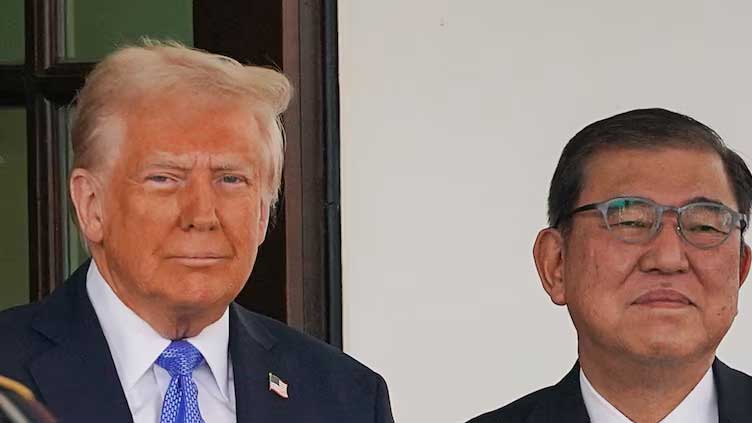Trump says US and Japan will work to cut trade deficit as he greets Ishiba

Business
Trump says US and Japan will work to cut trade deficit as he greets Ishiba
WASHINGTON (Reuters) - US President Donald Trump welcomed Japanese Prime Minister Shigeru Ishiba at the White House on Friday and said the two countries would work to cut Washington's trade deficit with Tokyo amid escalating trade tensions threatening to rupture the global economy.
"We love Japan!" Trump said as he greeted Ishiba and the two shook hands. Trump later told reporters at they sat together in the Oval Office that the two countries would work together to get U.S. trade deficit with Japan down to "even."
"Should be pretty easy to do," he said. "I don't think we'll have any problem whatsoever. They want fairness too." According to latest US trade data, Japan's 2024 goods trade surplus was $68.5 billion compared with $71.6 billion in 2023.
Ishiba told the president he was impressed by how Trump had survived an assassination attempt in July and that he realized then that the Republican would win the November US presidential election.
Ishiba said Japan was determined to work hand in hand with the United States to bring peace to the world and told Trump Japan was ready to boost investments in the US and highlighted plans by Japanese firms Toyota and Isuzu.
Trump said he would announce reciprocal tariffs on many countries next week.
Trump, whose first three weeks in office have shredded norms and shaken foreign capitals from Ottawa to Bogota, has taken a more conventional approach to Washington's longstanding Asia-Pacific allies, including Japan, South Korea, Australia and the Philippines.
But those friendships may be tested as Trump's early fight with China over synthetic opioids and warnings of tariffs against other countries - Japan included - threaten to disrupt commercial relations in Asia and beyond.
A senior Trump administration official told reporters the leaders would discuss military training exercises, increased cooperation on defense equipment and technology, foreign investment and energy.
They will also discuss cybersecurity, space and joint business opportunities in the artificial intelligence and semiconductor sectors, the official said.
"The United States is proud of our long and close alliance with Japan," the official said. "Our two nations will continue to work together to ensure we deter threats in the region through our full range of military capabilities," the official said.
Asked about the US trade deficit with Japan and the threat of tariffs, a second senior Trump administration official said: "We all know that President Trump pays a lot of attention to deficits as an indication of the economic fairness and strength of the relationship so I'm sure discussions will happen about that."
Trump put a 10% tariff on all imports from China in what he called an "opening salvo" in a clash between the world's two largest economies, sending consumers and businesses scrambling to adjust.
Japan is especially trade-dependent: it is a major exporter and counts on imports for much of its food and natural resources, and many of its firms are deeply invested in and reliant on China.
Tokyo shares the hawkish outlook towards China of Trump's national security team over Beijing's global ambitions and extensive territorial claims in Asia, including the vital chip-producing island of Taiwan.
At the same time, Japanese officials are wary of possible efforts by Beijing to court the US president with promises of cooperation on key global issues, including trade. Trump spoke to Chinese President Xi Jinping days before taking office and has said he will discuss tariffs with him soon.
Japanese officials speaking privately say they are comfortable in dealing with Trump's China hawks, including Secretary of State Marco Rubio and national security Michael Waltz, but less so with those in the administration with strong business ties with Beijing, such as billionaire Elon Musk, who has developed a significant Washington power base.
Trump and Ishiba are due to hold a joint press conference on Friday afternoon.
BRACING FOR TRUMP DEMANDS
For Tokyo, the early White House visit is a promising signal from the new Trump administration.
"There's two foreign heads of state that have been received in the Oval Office," said Rahm Emanuel, Biden's ambassador to Tokyo. "That's Bibi Netanyahu of Israel, and Japan. So that's a good thing, and that's a good sign."
Trump was close with the late Japanese Prime Minister Shinzo Abe but has no relationship with Ishiba, who took office in October. That is something Japanese officials want to change, and they plan to invite Trump to visit Japan.


